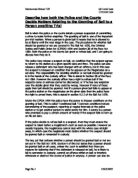- Fail to surrender to custody
- Commit an offence while on bail
- Interfere with witnesses or otherwise obstruct the course of justice.
The court can also refuse bail if it satisfied that the defendant should be kept in custody for his / her own protection or if he/she is a juvenile for his / her own welfare. Bail can also be refused if there has been inadequate time to obtain sufficient information to make a decision on bail. In deciding whether to grant bail, the court will consider various factors including :
- The nature and seriousness of the offence, and the probable method of dealing with it
- The character (past record), associations and community ties of the defendant
- The defendant record as respects the fulfilment of his obligations under previous grants of bail in criminal proceedings
- The strength of the evidence against him.
If a defendant is charged with an offence which is not punishable by imprisonment, bail can only be refused if the defendant has previously failed to surrender to bail and there are grounds for believing that he/she will not surrender on this occasion. Under the Criminal Justice Act 1988, the magistrates must provide reasons when they grant bail for murder, manslaughter or rape. They must be announced in open court and recorded in the register. The defendant is given a copy of the bail record.
A court can make conditions for the granting of bail. These are similar to conditions which can be set by the police and may include the surrender of passport and / or reporting to a police station. The court can also make a condition as to where the accused must reside while on bail – this could be at the home address or at a bail hostel. The court (and the police) can require a surety for bail. Another person promises to pay the court a certain sum of money if the defendant fails to attend court. The magistrates’ court not only deal with bail from the time of first appearance but may confirm, vary or remove conditions of police bail or remand a defendant in custody.
The Bail (Amendment )Act 1993 gave the prosecution the right to appeal to a judge at the Crown Court against the granting of bail provided :
- The offence charged carries a maximum sentence of at least 5 years imprisonment, or is the offence of taking a conveyance without consent
- The prosecution objected to bail
- The prosecution give immediate verbal notice of the interaction to appeal followed by a written notice to the magistrates within 2 hours.
The criminal justice and Public order Act s 26 amended the Bail Act so that the presumption in favour of bail is removed where it appears that the defendant has committed a triable either way offence or an indictable offence, while already on bail for another offence (However, the court can still grant bail). Section 25 of the Criminal justice and Public Order Act 1994 also barred courts from granting bail in cases of murder, attempted murder, manslaughter, rape or attempted rape where the defendant had already served a custodial sentence for such an offence on a previous occasion. The total bar on bail was challenged as being a breach of the convention of Human Rights and in 1998, the Government abolished this provision. Section 56 of the Crime and Disorder Act 1998 states that a defendant can only be granted bail in such cases if the court is satisfied that there are exceptional circumstances. If new information comes to light after the original police bail decision, the prosecution may apply to the magistrate’s court to have bail revoked or to have conditions imposed.
- Comment on the adequacy of these provisions
The Bail Act of 1976 was designed to place restrictions on the wide discretion formerly held by magistrates in the granting of bail and at the same time to increase the number of defendants released on bail before trial.
Bail is a right, not a privilege as the Bail Act of 1976 makes plain: s4. However, this ‘right’ is not in practice a right because there are a wide range of circumstances where bail will not be granted. If the magistrates refuse bail at one appearance the defendant can only make a renewed application to the bench if there has been a ‘change of circumstances’. In practice it is very difficult to show this and appeals to the higher court are wasteful of time and money and unjust to the accused.
The police have criticised the Bail Act of 1976 because they stated that more defendants would be granted bail and that there would be an increase in criminal offences. The percentage of defendants granted bail by magistrates has remained fairly constant from 1986 to 1996. Defendants in custody now spend far longer awaiting trial: In 1975 the average time spent on remand in prison was 25 days, whereas in 1994 it had risen to 59 days for males and 44 days for females. The criminal justice system has to balance the conflicting interests of the defendant (who is presumed innocent at this stage and entitles to his liberty) against the needs of the public to be protected from potentially dangerous criminals.
Many people think that more defendants could be safely released into the community pending trial. In 1994, 23% of defendants remanded in custody at some stage were acquitted (or their case was not proceeded with) and a further 34% ultimately received a non-custodial sentence. There is growing evidence that magistrates are increasingly less likely to ‘rubber stamp’ objections to bail.
A Home office survey suggested that about 10% of those on bail commit further offences during the bail period (known as Bail bandits). The changes made by the Bail (Amendment) Act of 1993 and the Criminal Justice and Public Order Act 1994 are attempts to keep the balance between defendants civil rights and the protection of the public.
For defendants who are homeless and have no fixed address bail hostels run by the probation service provide some degree of supervision for defendants who would otherwise have no bail. ‘Electronic tagging’ with curfew orders are now being used more often as a condition of bail. At a time of prison overcrowding it is now very important that something is done for practical and for moral reasons to keep people out of prison. About 20% of people in our prisons are defendants who have not been tried, but are remanded in custody. They will not be entitled to any compensation for their time they have spent in prison.
Bibliography
English Legal system / 101 questions and answers /Charles P Reed /1999/ Old Bailey Press
Law for GCSE / P Shears / 4th Edition / 1998 / Longman
English Legal system / J martin / 2nd edition / 2000 / Hodder ands Stoughton
‘A’Level Law / 3rd edition / T. Dugdale, M Furmston, S Jones, C Sherrin /1996 / Butterworths
Law (2nd edition) 2003 Hodder and Stoughton J. Martin
Internet
The law commission – Bail and the Human Rights Act 1998
Probation – Home office ‘Electronic tagging’








